Do you have a degree in finance or serious accounting skills? If so, now is a great time to start your own financial business and stop drivingsomebo ...
You might consider targeting a niche, such as bookkeeping for small retail businesses.
We earn commissions if you shop through the links below. Read more
Written by: Carolyn Young
Carolyn Young is a business writer who focuses on entrepreneurial concepts and the business formation. She has over 25 years of experience in business roles, and has authored several entrepreneurship textbooks.
Edited by: Mark Stewart
Mark Stewart is the in-house Certified Public Accountant, an accomplished author and financial media specialist.
Published on June 7, 2023

Investment range
$2,600 - $6,000
Revenue potential
$72,000 - $660,000 p.a.
Time to build
0 – 3 months
Profit potential
$64,800 - $198,000 p.a.
Industry trend
Growing
Commitment
Flexible
When opening your bookkeeping business, keep these essential aspects in mind:
You May Also Wonder:
Is a bookkeeping business profitable?
Yes, a bookkeeping business can be profitable. By offering services that help businesses maintain accurate financial records and handle transactions, bookkeepers provide value to their clients. Many businesses, especially small and medium-sized enterprises, outsource bookkeeping tasks to focus on their core operations. As a result, bookkeeping businesses can generate revenue through service fees charged to clients, and profitability will depend on factors such as the number of clients, pricing, efficiency, and overhead costs.
What happens during a typical day at a bookkeeping business?
A typical day at a bookkeeping business involves various tasks. These can include recording financial transactions, reconciling bank statements, processing payroll, managing accounts payable and receivable, generating financial reports, communicating with clients, and staying updated on accounting regulations. Additionally, utilizing bookkeeping software and tools to streamline processes and enhance efficiency is crucial to maintaining accurate records and providing timely financial information to clients.
What is the growth potential of a bookkeeping business?
The growth potential of a bookkeeping business can be significant. As businesses focus on their core operations, outsourcing bookkeeping services becomes more common. By effectively marketing and networking, a bookkeeping business can attract new clients and expand its client base. Additionally, as businesses grow and require more complex financial management, the need for comprehensive bookkeeping services increases. Expanding service offerings, such as financial analysis, budgeting, and advisory services, can further contribute to the growth potential of a bookkeeping business.
What type of business is a bookkeeping business?
A bookkeeping business typically falls under the category of service-based businesses. It provides professional bookkeeping services to other businesses, organizations, or individuals.
Can you start a bookkeeping business on the side?
Yes, it is possible to start a bookkeeping business on the side. Many individuals begin their bookkeeping business as a part-time endeavor while still maintaining their current job or commitments. This allows for gradual growth, building a client base, and testing the viability of the business.
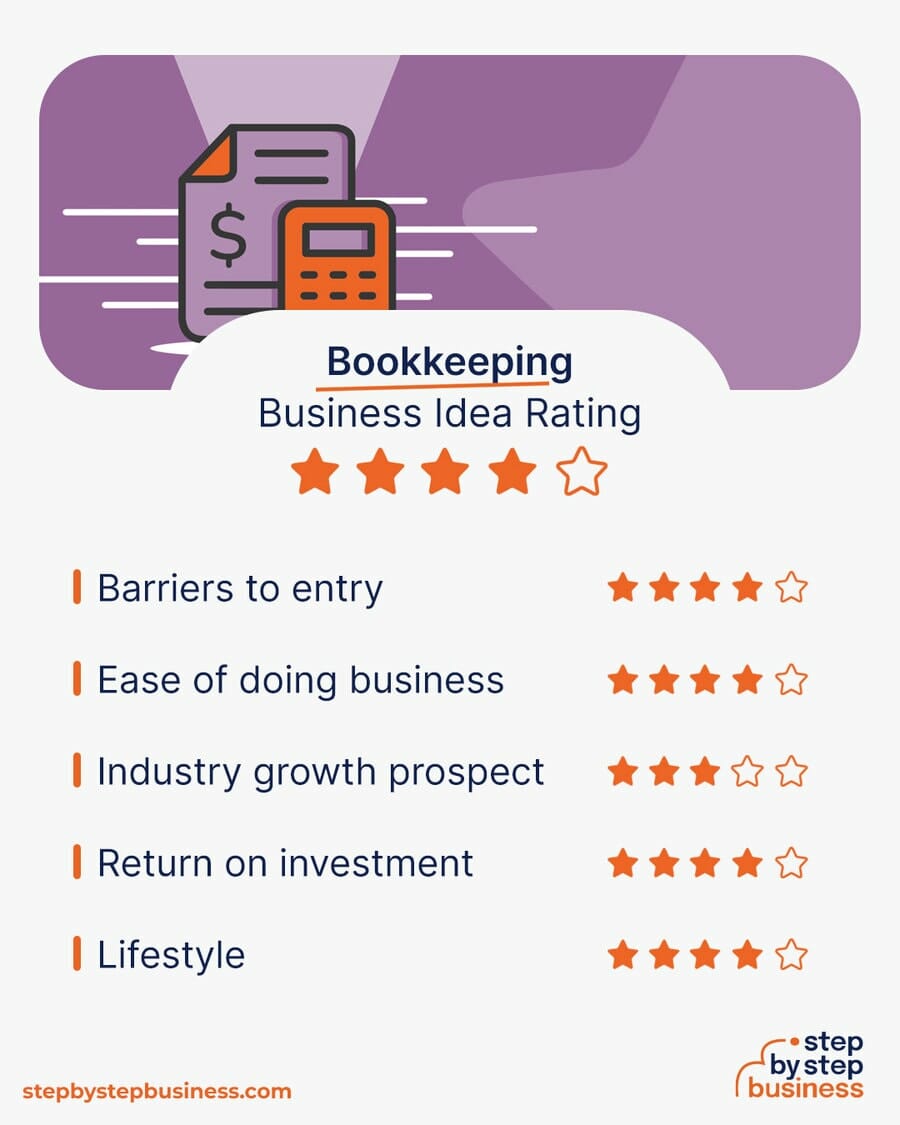

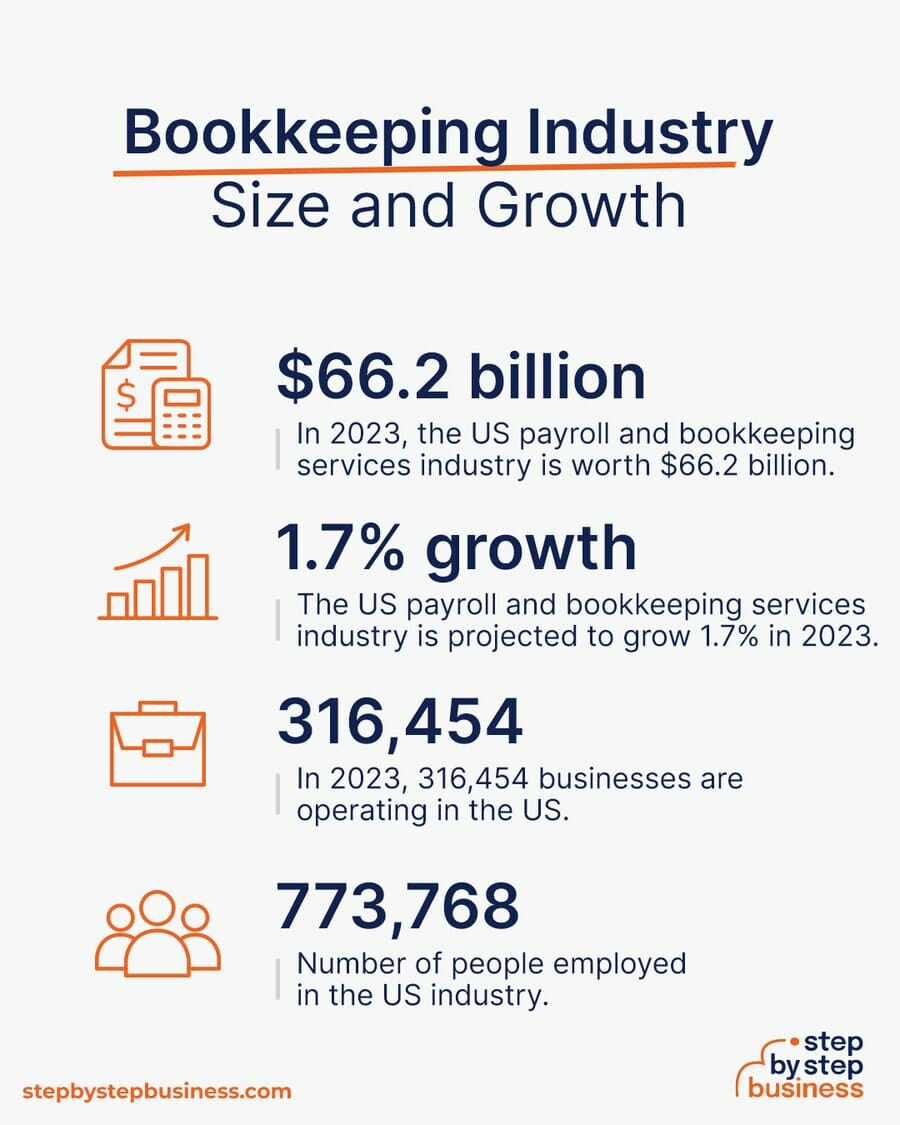
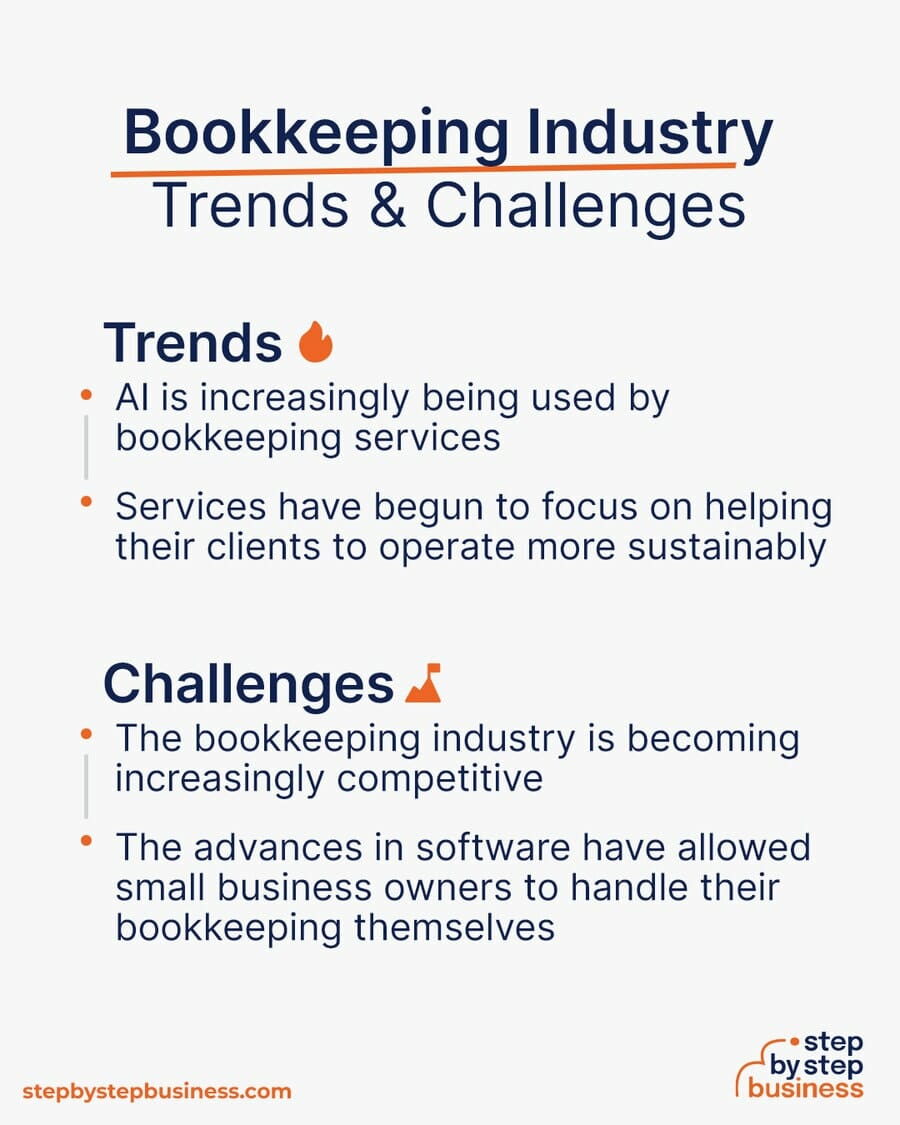
Trends
Challenges
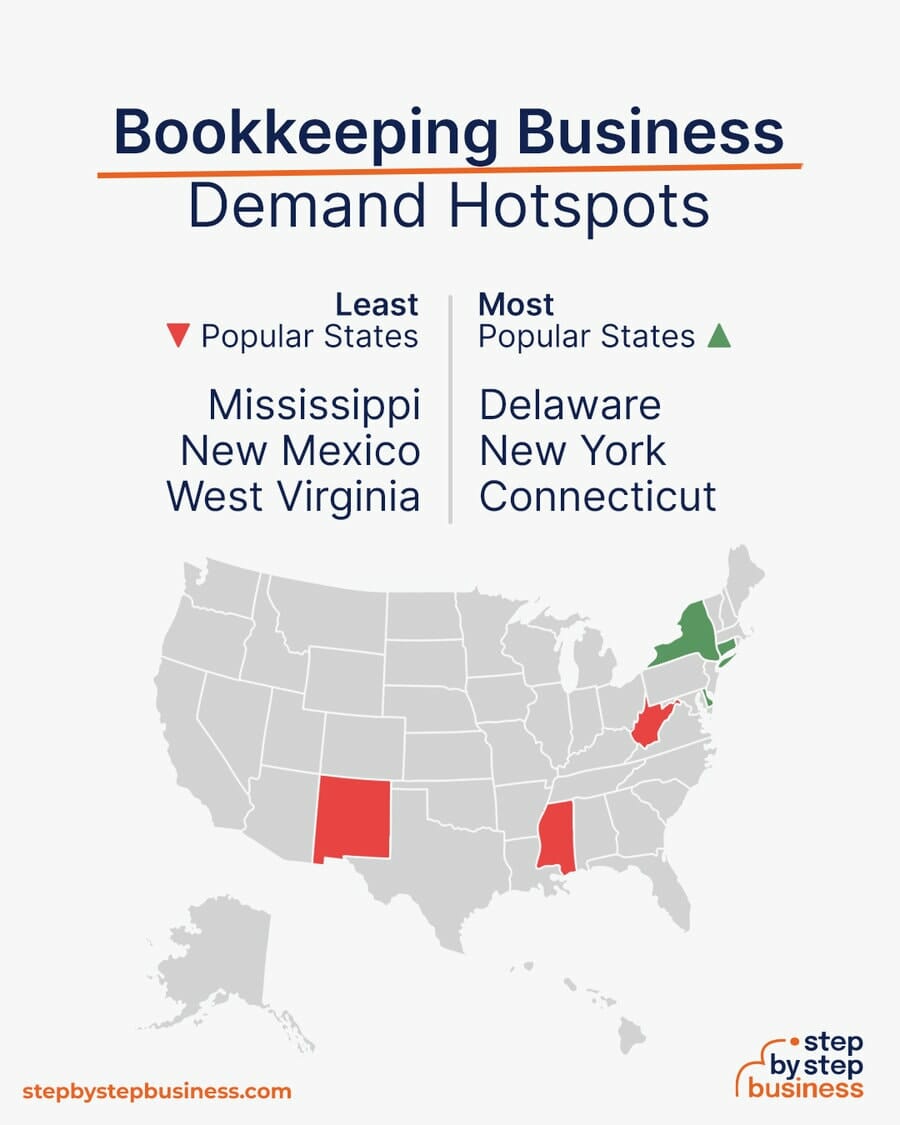
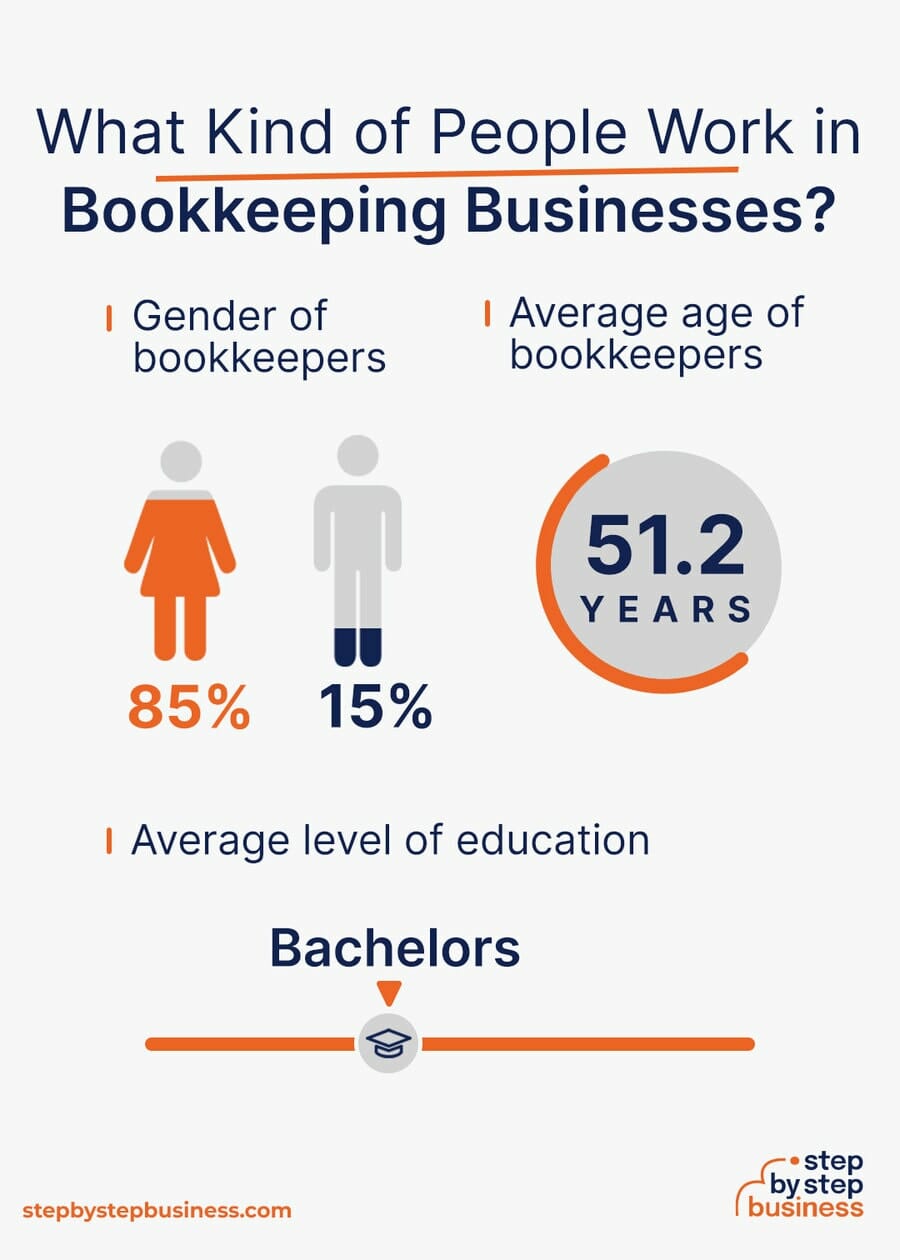
Startup costs for a bookkeeping business range from $2,500 to $6,000. Costs include a computer, software, a website, and a marketing budget.
You’ll need a handful of items to successfully launch your bookkeeping business, including:
| Start-up Costs | Ballpark Range | Average |
|---|---|---|
| Setting up a business name and corporation | $100 - $500 | $300 |
| Business licenses and permits | $100 - $300 | $200 |
| Insurance | $100-$500 | $300 |
| Website | $500 - $1,000 | $750 |
| Computer | $1,000 - $2,000 | $1,500 |
| Accounting software | $300 - $700 | $500 |
| Sales and marketing budget | $500 - $1,000 | $750 |
| Total | $2,600 - $6,000 | $4,300 |
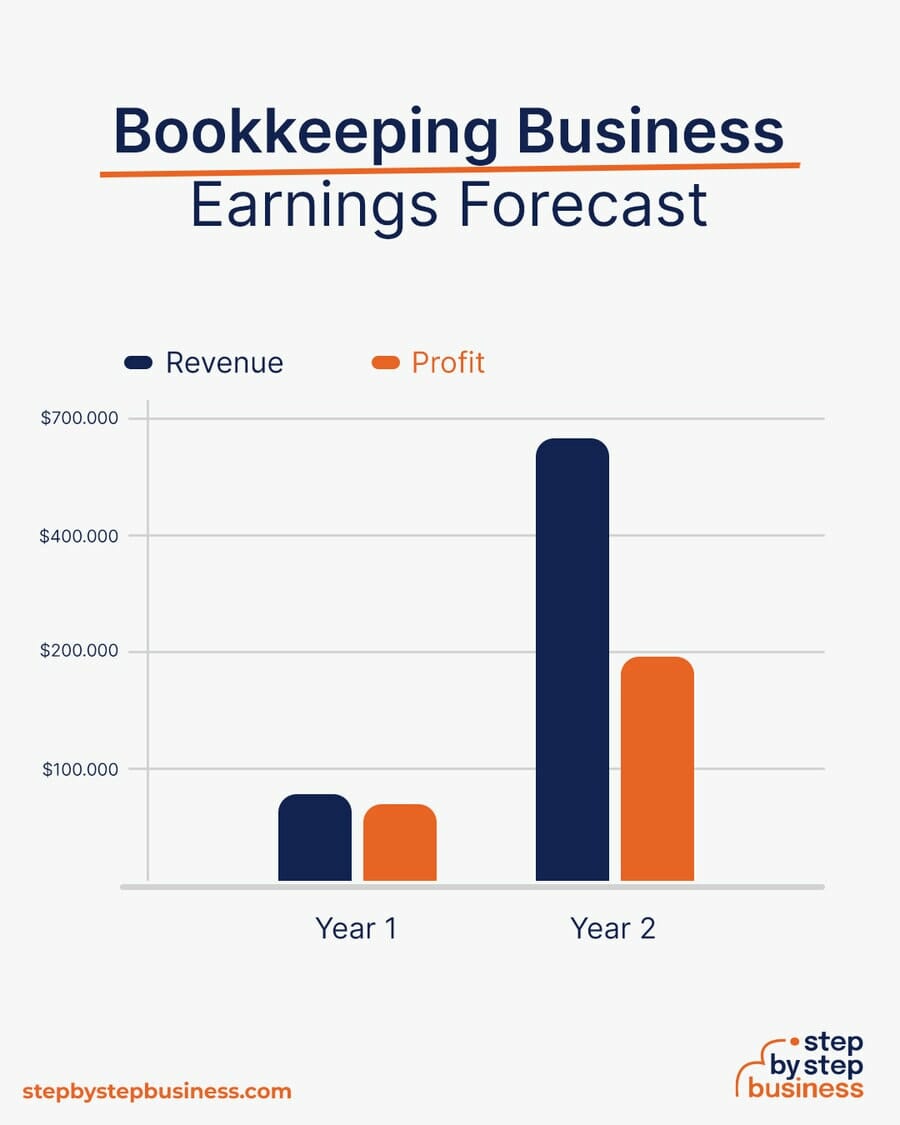
You can generally charge $500 to $2,500 per month for bookkeeping services depending on the extent and complexity of the services. Your profit margin when you’re working by yourself should be about 90%. These calculations will assume that your average monthly charge per client will be $1,500.
In your first year or two, you could work from home for four clients, bringing in $72,000 in revenue. This would mean $64,800 in profit, assuming that 90% margin.
As you gain traction, you might have 20 clients. At this stage, you might have an office and hire staff including other bookkeepers, reducing your margin to around 30%. With annual revenue of $660,000, you’d make a tidy profit of $198,000.
There are a few barriers to entry for a bookkeeping business. Your biggest challenges will be:

Now that you know what’s involved in starting a bookkeeping business, it’s a good idea to hone your concept in preparation to enter a competitive market.
Market research could give you the upper hand even if you’ve got the perfect product. Conducting robust market research is crucial, as it will help you better understand your customers, your competitors, and the broader business landscape.
Research bookkeeping businesses in your area to examine their services, price points, and customer reviews.
This should identify areas where you can strengthen your business and gain a competitive edge to make better business decisions.
You’re looking for a market gap to fill. For instance, maybe the local market is missing a bookkeeping service that specializes in bookkeeping for manufacturing businesses.
You might consider targeting a niche, such as bookkeeping for small retail businesses.
This could jumpstart your word-of-mouth marketing and attract clients right away.
Your services should include at least the following:
Additional services often provided by bookkeepers include:
The cost of bookkeeping services varies based on factors like the bookkeeper’s experience, the complexity and volume of transactions, and the geographical location. Rates typically range from $30 to $90 per hour in the United States as of 2023 (CPAs typically charge $200 – $250 per hour), but can also be structured as a flat monthly fee. The specific industry of the client and any additional services offered, like tax preparation or financial analysis, can also influence the pricing.
You can use our profit margin calculator to determine your mark-up and final price points. Remember, the prices you use at launch should be subject to change if warranted by the market.
Your target market will be business owners in your area. You can connect with them on LinkedIn or call them directly.
In the early stages, you may want to run your business from home to keep costs low. But as your business grows, you’ll likely need to hire workers for various roles and may need to rent out an office. You can find commercial space to rent in your area on sites such as Craigslist, Crexi, and Instant Offices.
When choosing a commercial space, you may want to follow these rules of thumb:

Here are some ideas for brainstorming your business name:
Once you’ve got a list of potential names, visit the website of the US Patent and Trademark Office to make sure they are available for registration and check the availability of related domain names using our Domain Name Search tool. Using “.com” or “.org” sharply increases credibility, so it’s best to focus on these.
Finally, make your choice among the names that pass this screening and go ahead and reserve your business name with your state, start the trademark registration process, and complete your domain registration and social media account creation.
Your business name is one of the key differentiators that sets your business apart. Once you pick a name, reserve it and start with the branding, it’s hard to switch to a new name. So be sure to carefully consider your choice before moving forward.
Here are the key components of a business plan:

If you’ve never created a business plan, it can be an intimidating task. You might consider hiring a business plan specialist to create a top-notch business plan for you.
Registering your business is an absolutely crucial step — it’s the prerequisite to paying taxes, raising capital, opening a bank account, and other guideposts on the road to getting a business up and running.
Plus, registration is exciting because it makes the entire process official. Once it’s complete, you’ll have your own business!
Your business location is important because it can affect taxes, legal requirements, and revenue. Most people will register their business in the state where they live, but if you are planning to expand, you might consider looking elsewhere, as some states could offer real advantages when it comes to bookkeeping business.
If you’re willing to move, you could really maximize your business! Keep in mind, it’s relatively easy to transfer your business to another state.
Business entities come in several varieties, each with its pros and cons. The legal structure you choose for your bookkeeping business will shape your taxes, personal liability, and business registration requirements, so choose wisely.
Here are the main options:

We recommend that new business owners choose LLC as it offers liability protection and pass-through taxation while being simpler to form than a corporation. You can form an LLC in as little as five minutes using an online LLC formation service. They will check that your business name is available before filing, submit your articles of organization, and answer any questions you might have.
Choose Your State
The final step before you’re able to pay taxes is getting an Employer Identification Number, or EIN. You can file for your EIN online or by mail or fax: visit the IRS website to learn more. Keep in mind, if you’ve chosen to be a sole proprietorship you can simply use your social security number as your EIN.
Once you have your EIN, you’ll need to choose your tax year. Financially speaking, your business will operate in a calendar year (January–December) or a fiscal year, a 12-month period that can start in any month. This will determine your tax cycle, while your business structure will determine which taxes you’ll pay.
The IRS website also offers a tax-payers checklist, and taxes can be filed online.
It is important to consult an accountant or other professional to help you with your taxes to ensure you are completing them correctly.
Securing financing is your next step and there are plenty of ways to raise capital:

Bank and SBA loans are probably the best option, other than friends and family, for funding a bookkeeping business.

Starting a bookkeeping business requires obtaining a number of licenses and permits from local, state, and federal governments.
Federal regulations, licenses, and permits associated with starting your business include doing business as (DBA), health licenses and permits from the Occupational Safety and Health Administration (OSHA), trademarks, copyrights, patents, and other intellectual properties, as well as industry-specific licenses and permits.
You may also need state-level and local county or city-based licenses and permits. The license requirements and how to obtain them vary, so check the websites of your state, city, and county governments or contact the appropriate person to learn more.
You could also check this SBA guide for your state’s requirements, but we recommend using MyCorporation’s Business License Compliance Package. They will research the exact forms you need for your business and state and provide them to ensure you’re fully compliant.
This is not a step to be taken lightly, as failing to comply with legal requirements can result in hefty penalties.
If you feel overwhelmed by this step or don’t know how to begin, it might be a good idea to hire a professional to help you check all the legal boxes.
Before you start making money, you’ll need a place to keep it, and that requires opening a bank account.
Keeping your business finances separate from your personal account makes it easy to file taxes and track your company’s income, so it’s worth doing even if you’re running your bookkeeping business as a sole proprietorship. Opening a business bank account is quite simple, and similar to opening a personal one. Most major banks offer accounts tailored for businesses — just inquire at your preferred bank to learn about their rates and features.
Banks vary in terms of offerings, so it’s a good idea to examine your options and select the best plan for you. Once you choose your bank, bring in your EIN (or Social Security Number if you decide on a sole proprietorship), articles of incorporation, and other legal documents and open your new account.
Business insurance is an area that often gets overlooked yet it can be vital to your success as an entrepreneur. Insurance protects you from unexpected events that can have a devastating impact on your business.
Here are some types of insurance to consider:


As opening day nears, prepare for launch by reviewing and improving some key elements of your business.
Being an entrepreneur often means wearing many hats, from marketing to sales to accounting, which can be overwhelming. Fortunately, many websites and digital tools are available to help simplify many business tasks.
You’ll want to use bookkeeping software, such as Sage, synder, or Xero.
Website development is crucial because your site is your online presence and needs to convince prospective clients of your expertise and professionalism. You can create your own website using services like WordPress, Wix, or Squarespace. This route is very affordable, but figuring out how to build a website can be time-consuming. If you lack tech-savvy, you can hire a web designer or developer to create a custom website for your business.
Your customers are unlikely to find your website, however, unless you follow Search Engine Optimization (SEO) practices. SEO will help your website appear closer to the top in relevant search results, a crucial element for increasing sales.
Make sure that you optimize calls to action on your website. Experiment with text, color, size, and position of calls to action such as “Schedule Consultation Now”. This can sharply increase purchases.
Here are some powerful marketing strategies for your future business:

Unique selling propositions, or USPs, are the characteristics of a product or service that sets it apart from the competition. Customers today are inundated with buying options, so you’ll have a real advantage if they are able to quickly grasp how your bookkeeping business meets their needs or wishes. It’s wise to do all you can to ensure your USPs stand out on your website and in your marketing and promotional materials, stimulating buyer desire.
Global pizza chain Domino’s is renowned for its USP: “Hot pizza in 30 minutes or less, guaranteed.” Signature USPs for your bookkeeping business could be:
You may not like to network or use personal connections for business gain. But your personal and professional networks likely offer considerable untapped business potential. Maybe that Facebook friend you met in college is now running a bookkeeping business, or a LinkedIn contact of yours is connected to dozens of potential clients. Maybe your cousin or neighbor has been working in bookkeeping for years and can offer invaluable insight and industry connections.
The possibilities are endless, so it’s a good idea to review your personal and professional networks and reach out to those with possible links to or interest in bookkeeping businesses. You’ll probably generate new customers or find companies with which you could establish a partnership.

If you’re starting out small from a home office, you may not need any employees. But as your business grows, you will likely need workers to fill various roles. Potential positions for a bookkeeping business include:
At some point, you may need to hire all of these positions or simply a few, depending on the size and needs of your business. You might also hire multiple workers for a single role or a single worker for multiple roles, again depending on need.
Free-of-charge methods to recruit employees include posting ads on popular platforms such as LinkedIn, Facebook, or Jobs.com. You might also consider a premium recruitment option, such as advertising on Indeed, Glassdoor, or ZipRecruiter. Further, if you have the resources, you could consider hiring a recruitment agency to help you find talent.

If you’re a bookkeeper, it could be a great time to go out on your own and start your own bookkeeping business. The market is growing, so your business could be quite profitable. You can build a team over time and really take your business to the next level.
You understand the business now, so you’re ready to find some clients and get your successful bookkeeping business started!

Published on April 1, 2023
Do you have a degree in finance or serious accounting skills? If so, now is a great time to start your own financial business and stop drivingsomebo ...
Read Now

Published on December 4, 2022
Remember that time you found a $20 bill in the pocket of your old jeans? Now, imagine experiencing that kind of unexpected delight, but instead offi ...
Read Now
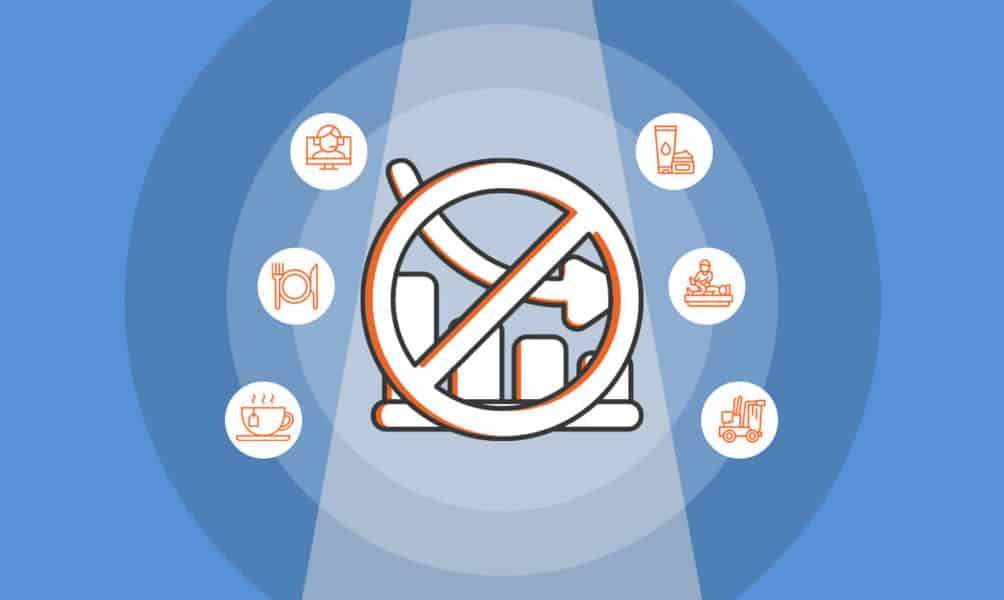
Published on August 26, 2022
We keep hearing about a looming recession, so one would imagine this is a terrible time to start a business. But an economic downturn can be a great ...
Read Now
No thanks, I don't want to stay up to date on industry trends and news.
Comments